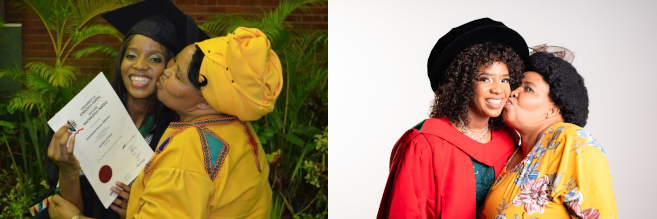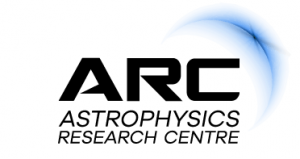Schoolgirl’s Encounter with Astronomy Leads to Doctoral Degree

Dr Sinenhlanhla Sikhosana’s first encounter of an informative kind with astronomy was when as a young schoolgirl she attended an astrophysics and cosmology career exhibition week at UKZN, learning that she could pursue a career in the field and that funding opportunities were available.
With stars in her eyes, she graduated with a Doctor of Philosophy in Applied Mathematics from UKZN this afternoon!
After obtaining outstanding matric results, Sikhosana registered for a Bachelor of Science degree at the University, and in her first year was awarded a scholarship from the Astrophysics Research Centre (ARC) and later, a full undergraduate scholarship from the Square Kilometre Array (SKA) organisation.
Trail-blazing performances during her undergraduate studies saw her receive the Dean’s Commendation each year plus seven merit awards. She graduated cum laude with a BSc degree in 2014 majoring in Applied Mathematics and Physics, going on to complete a BSc honours degree cum laude and registering for a masters.
Sikhosana’s passion for outreach work grew while undertaking several projects through the ARC, the College of Agriculture, Engineering and Science (CAES) and the eThekwini Municipality with her desire to assist colleagues and others very evident by the number of hours she spent tutoring high school learners and undergraduate students.
Her master’s degree complete, Sikhosana moved on to doctoral research which involved using radio telescopes (in particular, the South African MeerKAT telescope and the GMRT telescope in India) to study galaxy clusters (massive objects in the universe, 1 000 000 000 000 00 times heavier than the mass of our sun).
‘The aim of the study, which involved a large sample of galaxy clusters, was to characterise diffuse radio sources that are produced when highly energetic electrons interact with magnetic fields. Such studies help identify the origin of these energetic electrons and can give insight on the evolution of the large-scale universe,’ she said.
Sikhosana described her doctoral studies in the words of Nelson Mandela: ‘It always seems impossible until it’s done’.
‘There were moments when I felt like this journey would never end,’ said Sikhosana. ‘The final year of my PhD overlapped with the global COVID-19 pandemic – this period truly tested my mental, emotional and physical capacity. However, having a strong support system was really what made this journey possible.’
Her supervisor, Professor Kavilan Moodley, said: ‘Sinenhlanhla has produced really exciting results for her PhD, which was focused on studying galaxy clusters using data from the MeerKAT and GMRT telescopes. Her analysis of extended radio sources has added new insights into how these systems behave. Sinenhlanhla’s determination in the pursuit of knowledge is an inspiration to all young scientific minds out there.’
Co-supervisor, Professor Mathew Hilton, added: ‘I am delighted that Sinenhlanhla has her PhD and that she’s been awarded a SARAO postdoctoral scholarship to continue her work on MeerKAT observations of galaxy clusters at UKZN. MeerKAT is the best instrument in the world right now for studying diffuse radio emission in galaxy clusters, and I look forward to seeing what Sinenhlanhla discovers with it.’
Dr Kenda Knowles, who also supervised Sikhosana’s work, said: ‘I’ve mentored Sinenhlanhla since her MSc, and it was a privilege to serve in a more formal role as a co-supervisor for her PhD work. She has the potential to become an outstanding researcher, showing a lot of research independence in the latter years of her PhD. I look forward to working with her during her new postdoc.’
Other awards notched up by Sikhosana at UKZN include UKZN Wonder Women in Science (2017); Department of Science and Technology TATA African Women in Science Doctoral Scholarship (2018); and the L’Oréal-UNESCO Women in Science research grant (2019). She was also among the top 20 young scientists selected to represent South Africa at the 69th Lindau Nobel Laureate Meeting in Germany in 2019; she was part of the South African Young Academy of Science’s blog team in 2020; and was recently elected as the Astrophysics Research Centre’s diversity and inclusion committee member as her passion also extends to the transformation of the science academic field.
Currently, Sikhosana is a South African Radio Astronomy Observatory (SARAO) postdoctoral fellow based at UKZN.
‘In future, I would like to get a permanent academic position and also participate in various science outreach initiatives that uplift communities through education. I believe that education is one of the tools that can transform communities,’ she said.
Words: Leena Rajpal
Article sourced from: ndabaonline
Inspiring Greatness
© University of KwaZulu-Natal: All Rights Reserved






